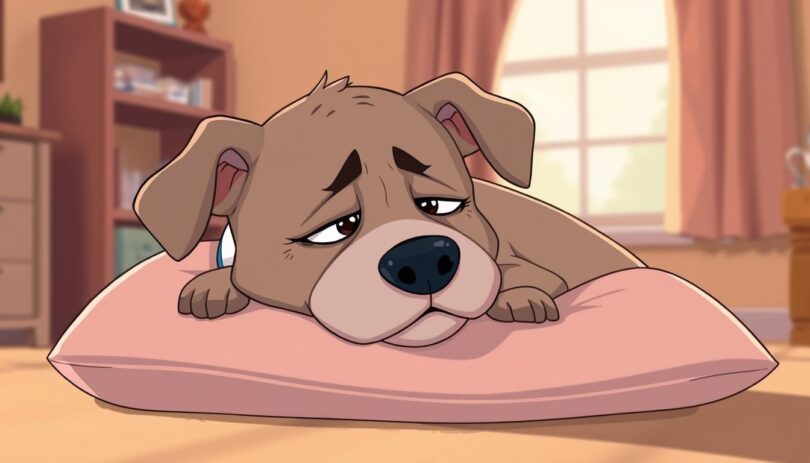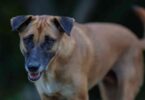Did you know 1 in 5 pets show mild reactions to routine vaccines? While these procedures protect against deadly diseases, temporary soreness often explains unusual behaviors. Recognizing these responses helps owners provide better care while maintaining essential health protocols.
Post-vaccination tenderness frequently occurs near injection sites. This discomfort might cause your companion to vocalize when resting in certain positions. The area could feel sensitive for 24-48 hours, much like humans experience after medical treatments.
Most reactions resolve without intervention. However, understanding your pet’s communication methods proves vital. Whining or reluctance to lie down often signals localized pain rather than severe complications. Gentle reassurance and monitoring usually ease their recovery.
Veterinary professionals emphasize that preventive care benefits far outweigh temporary side effects. Proper vaccine schedules reduce risks from parvovirus, rabies, and other threats. Knowing what to expect transforms routine vet visits into stress-free experiences for both you and your furry family member.
Stay observant during recovery periods. Track behavior changes and contact your clinic if symptoms persist beyond two days or intensify. This proactive approach ensures your pet receives timely support while maintaining their long-term wellbeing.
Understanding Vaccine Reactions in Dogs
Vaccines activate protective defenses but may cause temporary responses. These reactions show the body building immunity rather than indicating failure. Let’s explore what’s normal, when to worry, and how vaccines interact with biological systems.
Typical Post-Vaccination Responses
Most pets show mild symptoms like tiredness or slight fever. A small bump might form where the needle entered as immune cells gather. Nasal vaccines sometimes trigger sneezing fits that clear within days.
Red Flags Requiring Action
While rare, severe reactions demand immediate care. Watch for facial puffiness, repeated vomiting, or breathing struggles. These signs often appear quickly but can emerge up to two days post-vaccination.
Biological Defense Mechanisms
Vaccines teach the immune system to recognize threats safely. This training causes temporary inflammation as white blood cells practice responses. The process explains why mild discomfort often accompanies successful immunization.
Monitoring your companion’s recovery helps distinguish normal healing from emergencies. For comprehensive pet care tips, including vaccination schedules, maintain regular vet consultations. Always keep clinic contact information accessible during recovery periods.
Why Dog Whines When Laying on Neck After Shot
Have you ever wondered how pets express physical discomfort? Post-shot behaviors often serve as their primary language for signaling unease. Recognizing these cues helps owners respond appropriately while respecting medical protocols.
Interpreting Whining as a Communication of Discomfort
Vocalizations after shots usually indicate localized inflammation at the injection site. Muscle tenderness develops as immune cells cluster to process the vaccine. This sensitivity may intensify when pressure gets applied during rest.
Pets lack verbal communication tools, making whining their go-to alert system. These sounds often accompany visible signs like flinching when touched near the affected area. Monitoring pitch and frequency helps assess pain levels.
Additional Behavioral Indicators to Watch For
Beyond vocal cues, watch for posture adjustments. Some animals avoid lying on the vaccinated side or resist being lifted. Others display stiffness when moving their head or neck.
Protective instincts might surface as guarded movements or unusual sleep positions. Temporary appetite changes or reduced playfulness could also suggest discomfort. Most symptoms fade within 48 hours.
Limping occasionally appears if multiple vaccines were administered. While concerning, this typically resolves faster than pet owners expect. Documenting these reactions helps veterinarians tailor future treatment plans.
Preventing and Managing Vaccine Reactions
Proactive care minimizes risks while keeping immunization benefits intact. Thoughtful preparation transforms routine vet visits into safer experiences for pets and owners alike.
Preventative Measures for Safer Vaccinations
Sharing your pet’s medical history helps veterinarians customize care. Previous sensitivities guide protocol adjustments like splitting doses or using alternative formulas. Smaller breeds often benefit from spaced-out appointments to reduce immune system stress.
Clinics may suggest antihistamines before shots for high-risk animals. Calming techniques like pheromone sprays or favorite toys ease anxiety during visits. These strategies lower stress-related responses while maintaining vaccine effectiveness.
When to Contact Your Veterinarian or Emergency Clinic
Immediate action becomes crucial if breathing difficulties or facial swelling develop post-vaccination. These signs often indicate severe allergic responses needing epinephrine or intravenous fluids. Time-sensitive treatments prevent complications when administered promptly.
Persistent vomiting or lethargy lasting over two days warrants professional evaluation. Mild soreness typically fades quickly, but worsening symptoms suggest deeper issues. Always keep clinic numbers accessible during recovery periods.
Detailed vaccination records help medical teams spot patterns and optimize future care. Regular check-ins ensure your companion receives protection without unnecessary risks.
Final Insights for Responsible Pet Care
Protecting your companion’s health requires balancing prevention with awareness. Vaccinations remain essential armor against deadly diseases like parvovirus and rabies. While temporary discomfort might occur, these minor reactions pale compared to the lifesaving benefits of immunization.
Building trust with your veterinary team creates tailored protection plans. Share your pet’s medical history openly – this helps professionals adjust schedules or formulas if needed. Consistent communication turns routine shots into optimized care strategies.
Knowledge transforms worry into confident action. Recognizing normal post-shot behaviors like brief tenderness helps avoid panic. Save clinic contacts for urgent symptoms like breathing difficulties, while monitoring typical soreness at home.
Your proactive approach safeguards long-term wellbeing. Track reactions diligently and maintain updated records. This partnership between informed owners and veterinary experts ensures pets enjoy full, protected lives through science-backed care.
FAQ
What vaccine reactions require emergency veterinary care?
Seek immediate help if you notice facial swelling, vomiting, diarrhea, difficulty breathing, or collapse. Severe allergic reactions (anaphylaxis) usually occur within minutes to hours post-vaccination and demand urgent intervention to ensure pet safety.
Why might a pet vocalize after vaccinations?
Whining or whimpering often signals discomfort near the injection area, muscle soreness, or stress from the clinic visit. Persistent vocalization paired with pacing or hiding could indicate heightened pain sensitivity requiring veterinary assessment.
Are mild reactions to vaccines normal in pets?
Yes, mild symptoms like lethargy, temporary appetite loss, or slight swelling at the injection site are common. These typically resolve within 24–48 hours as the immune system processes the vaccine. Monitor your pet closely and provide a quiet recovery space.










Leave a Comment